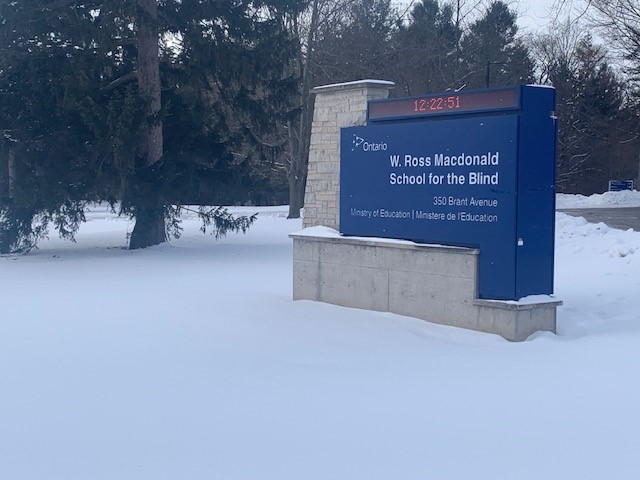The three-hour drive between home and school is finally over for Stephanie Antone and her 11-year-old daughter, but not her mother’s frustrations.

While most of Ontario’s two million kids returned to class and their regular routines early in January amid an Omicron-delayed restart of the school year, that wasn’t the case for Antone and her low-blind daughter, Yehati.
Instead, like many families who rely on special provincially operated schools for those who are deaf and blind, the Oneida of the Thames mother and her daughter commuted to Brantford so she could attend school in person after a residential program there for students like Yehati was shelved in late December as COVID-19’s highly contagious Omicron took hold in Ontario.
Friday, Ontario said it will restore residential programs this week at the schools, which serve both day students and others who live there. Reopening the lodgings also means weekly transportation that Yehati and other kids depend on, to get to school and back home on weekends, will resume.
“I feel a huge sense of relief,” said Antone.
“None of the parents should have to be commuting every day to have your child attend school in-person. None of us should’ve had to pay thousands and thousands of dollars out-of-pocket for hotel and Airbnb expenses,” she said, of parents who shifted closer to school so their kids could attend in-person classes.
Still, while she welcomes the move to resume the school lodging, Antone said she and other parents are frustrated by what they saw as a lack of communication by the province. She said she found out first through her daughter — not the school — that the residence would re-open Sunday.

“(Yehati) came into my room just about 10 a.m. (Friday) and said, `Yay, I’m going back to school. I said, Really? I haven’t got an email,”’ Antone said.
“The principal made an announcement for the students, but we (hadn’t) received anything. Nothing,” she said.
Parents were notified Friday evening that lodging would re-open Monday, according to a union official.
That means nearly three-quarters of the students at the W. Ross Macdonald school, from kindergarten to Grade 12, will go back to living there during the week.
- Ontario NDP sets ultimatum for legislature keffiyeh ban, threatening to defy rules
- Muslim human rights activist in need of kidney finds help from Jewish community
- S&P/TSX composite rises, Nasdaq leads Wall St. rally after tech earnings
- Toronto officer charged with perjury, attempt to obstruct justice: police
The provincial schools “support some of the most exceptional students in Ontario,” Education Minister Stephen Lecce said in an emailed statement. “We committed to returning these children to class, knowing how critical in-person learning is to their academic success, development and their mental and physical health.”
Ontario operates seven so-called provincial and demonstration schools, including two in London, for students with special needs. The London schools include the Robarts school for the deaf and the Amethyst school for those with severe learning disabilities. Besides Brantford, other schools are located in Milton and Belleville.
Antone could have resorted to online learning for her daughter, but said that option comes with barriers including eye strain and little motivation.
“How do you have a blind child learn online?” she asked.
For Yehati, living in an accessible residence with access to school, life skills and new friends creates a world of difference, her mother said.
“I feel really happy that it’s open again because all the students that are in lodging get more support than we would have online,” Yehati said.
The activity that excites her the most? “Goalball on Wednesdays,” she said. The sport is designed specifically for those who are visually impaired or blind.

The return of residential programs comes with tightened public health and safety measures, from required three-ply masks to increased COVID-19 screening and testing for staff, students and family members, along with stricter isolation protocols.
That move followed a memo sent to staff that said Ontario’s chief medical officer of health had deemed demonstration schools and lodgings a “high-risk congregate setting for the purposes of (COVID-19) contact tracing, isolation and PCR testing,” with the tighter precautions needed because of the mixing of day and residential students including some with complex needs.
While COVID-19 remains a concern, Antone said she’s confident her daughter’s school — which has never had an outbreak — can keep students safe.
“Their lodging quarters are bigger than my house,” she said.

The reopening of the residences came amid petitions and social media posts by parents and students.
David Sykes of the union representing teachers at the schools, the Provincial Schools Authority Teachers, also pushed for the move, and said the union’s focus will now return to resources and programs at the schools which he said have been eroded in recent years, leaving fewer deaf and hard of hearing children getting the critical early intervention support they need.
“Our struggle doesn’t change,” said Sykes. “It changes our messaging only in so far that (the union) wanted us to speak to the lodging, unfairness and question the decision-making. Now, our focus is back to where we were before.”
Antone said better transparency is needed between provincial school officials and families, who don’t have a school board to go through with the system run directly by the province.
“So, what does that mean for me as a parent?” she asked. “We don’t have a lot of avenues.”
Lecce’s office did not respond to a question about parental concerns over communication with the schools.




Comments